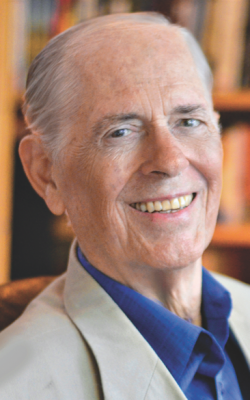Of the many personal memories I have of theologian Thomas Oden, one is most prominent. It was the late 1990s, and he was sitting at our conference table after hours of a drifting committee meeting. Without prompting, he spontaneously delivered a 15-minute talk about his parallel spiritual life with then-First Lady Hillary Clinton. They had both been raised in Methodist homes, read the same church publications, attended the same kind of church activist meetings, known the same church personages, and enthusiastically adopted the same commitment to political progressivism. We all listened with rapt amazement.
In those days there were no smartphones for quick recording. Afterward I asked him to publish his extemporaneous tour de force. He politely said he’d try but weeks later regretted he couldn’t since he lacked the time to reassemble his thoughts. No doubt Tom was back to work writing another of his dozens of published books. Over the next couple of decades there would be other spontaneous, masterful perorations from Tom, but I never learned to stand by with a recording device.
From Heresy to Orthodoxy
Tom’s memoir, A Change of Heart: A Personal and Theological Memoir, recounts his 80-year journey from small town, Depression-era, Oklahoma Methodist piety, to swimming in the confident but cresting high tide of social gospel mainline Protestantism, to his spiritual and intellectual encounter with Christian orthodoxy through the church fathers. Oden devoted himself almost exclusively to atoning for his years of theological malpractice by committing his next 40 years to rigorous scholarship, teaching, and organizing for creedal Christianity.
Having previously—like much of Methodism and mainline Protestantism—sought relevance through an endless stream of urgent political causes, theological fads, and parapsychologies, Tom later committed himself to stewardship of ancient church teachings. In the preface to one volume of a systematic theology, he declared:
The only claim I make is that there is nothing original in these pages. I present no revolutionary new ideas, no easy new way of salvation. The road is still narrow (Matt. 7:14). I do not have the gift of softening the sting of the Christian message, of making it seem light or easily borne or quickly assimilated into prevailing modern ideas.
Early in his midlife spiritual metamorphosis, Tom dreamt one night of discovering his own tombstone, which recalled of him: “He made no new contribution to theology.” He sought to faithfully transmit what the church had ecumenically assembled in its early centuries, ending his quest for self-empowerment through theological revision.
Ecumenical Methodist
Tom was the pre-eminent Methodist theologian in America since Albert Outler’s death nearly 30 years ago. But he was uniquely distinguished and admired not just within Methodism but also within wider Protestantism, evangelicalism, and even among Roman Catholics and Eastern Orthodox. He was arguably one of America’s most important Christian theologians over the last 50 years. Spending most of his career at United Methodism’s Drew Theological Seminary in New Jersey, his best-known works are a three-volume systematic theology, four volumes on John Wesley’s teachings, and 29 volumes of The Ancient Christian Commentary on Scripture. In 1995 he published Requiem: A Lament in Three Movements, his searing critique of mainline Protestant seminary liberalism, which earned him no bonus points among most of his colleagues. In his final years Tom published several books on the theological riches of early African Christianity.
His previous zeal for liberal Protestant activism through groups like the World Council of Churches and the Methodist Federation for Social Action transferred to new collaborations with the Evangelical Theological Society, publications like First Things and Christianity Today, and United Methodist renewal groups. Tom witnessed the decline of mainline Protestantism and sought to contribute to orthodoxy among evangelicals, Roman Catholics, and a remnant of traditional mainliners. Though he never minimized his own Wesleyan commitment, he worked seamlessly with Christians of many traditions because of his unifying devotion to the early church’s understanding of core doctrine.
Tom never seriously considered leaving Methodism; he cleaved to its distinctives and believed he had an obligation to the church that baptized and brought him to faith. He fiercely led the fight for upholding doctrinal standards at the 1988 United Methodist General Conference, was a friend to or participant in every major United Methodist evangelical renewal group, and to the end opposed quitting or dividing the denomination, always pointing to reformation through orthodoxy. Tom was never naïve about the labor, patience, or suffering required; he simply had faith the Lord would prevail.
Personal Remembrance
 I first met Tom when I was a young man. I had just joined the staff of the Institute on Religion and Democracy (IRD), whose board he would later join and chair across much of eight years. His shift from theological heterodoxy to Christian orthodoxy had included a political shift from Saul Alinsky devotee to Burkean conservative. Until the final months of his life he was emailing encouragement to our staff, both for church renewal and also reformation of Christian social witness.
I first met Tom when I was a young man. I had just joined the staff of the Institute on Religion and Democracy (IRD), whose board he would later join and chair across much of eight years. His shift from theological heterodoxy to Christian orthodoxy had included a political shift from Saul Alinsky devotee to Burkean conservative. Until the final months of his life he was emailing encouragement to our staff, both for church renewal and also reformation of Christian social witness.
Tom’s physical health had begun declining at least 10 years ago. His beloved wife, Edrita, died in 1998 of cancer after more than 40 years of marriage. As a widower he seemed to accelerate his scholarly and church labors, including global travel. At a 2009 IRD board meeting, where I would be elected president, he suffered a heart incident requiring hospitalization and early departure. (He warmly supported my appointment, which I don’t think affected his health!) He had to end his travels while continuing his intense writing schedule. In 2012 I visited his Oklahoma City home, seeing his legendary library, and interrupting his board meeting of the Center for Early African Christianity, which he founded and directed with his usual entrepreneurial vigor. In typical fashion, Tom introduced me to one Christian college official present by referencing an earlier controversy between myself and faculty at that school. Oden loved debate and intellectual, civil confrontation. I never saw him again in person, but in 2013 he addressed by Skype a small group at the Evangelical Theological Society. With white hair and measured wisdom, he seemed like an Obi Wan Kenobi figure who spoke with the authority of the apostolic age.
I deeply admired Tom from the start. He was brilliant, insightful, courageous, unwavering, and passionate in good causes. He was good natured and unfailingly gracious. He encouraged me in my vocation as a young man, and was still doing so in my middle age. Tom was smarter than almost everybody, but he never condescended. He seemed always to make time to counsel and mentor others. He could get angry over important principles but not—at least ever in my observation—over ego. He had endless good sense and was, to me, the consummate well-grounded Methodist who never forgot who he was or from where he came.
How I wish there could be from Tom at least one more soaring, extemporaneous recollection of great theological and ecclesiastical events. This time I’d make sure to record it. But the Lord whom Tom rediscovered and served for so long has preserved for us his own grace-filled record of Tom’s countless accomplishments in his service.
May Tom as faithful theologian and friend to so many never be forgotten in this world. And may he forever rejoice with the early saints whose lives and teachings he so closely studied—that we might know them and our triune God better.





